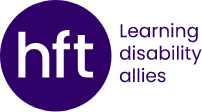What is a learning disability?
Valuing People, the Department of Health’s 2001 whitepaper on a ‘New strategy for learning disability in the 21st century’, stated that a learning disability included the presence of: –
- a significantly reduced ability to understand new or complex information, to learn new skills (impaired intelligence),
- a reduced ability to cope independently (impaired social functioning), and
- which started before adulthood, with a lasting effect on development
…meaning that learning disabilities can make everyday life more challenging, and that support might be needed in order for the person to live with as much independence and choice as possible. They do not define the person however. While learning disabilities are life-long, and cannot be cured, many support services, such as Hft, exist to support people with learning disabilities to live the best lives possible.
Learning disabilities are often just one aspect of a wider condition, or number of conditions, including other disabilities. For example, someone with Angelman syndrome (a genetic condition) will likely present with a number of different symptoms, with a learning disability being just one of them. For this reason, it’s important to take a person-centred approach to supporting anyone with a learning disability, seeing the whole person rather than focusing on any one aspect of their life.
Learning disabilities affect people to widely differing degrees – often described as the learning disability continuum. People with a mild learning disability are often independent in caring for themselves and carrying out everyday tasks, while people with a profound learning disability will likely have considerable difficulty in communicating and very limited understanding.
Other terms
In other countries different terms are used, such as intellectual disability, intellectual developmental disorder, learning disorder, or learning difference.
In the UK we use the term ‘learning disability’, often interchangeably with ‘learning difficulty’. At Hft, when we talk about a learning difficulty, we’re usually talking about a condition in an educational context. Learning difficulties can make processing information more difficult in certain circumstances – Dyslexia is an example of what we would describe as a learning difficulty.
Support for people with learning disabilities
At Hft we focus on what people can do, rather than on what they can’t, supporting them to take control of their lives. Find out more about the services we offer people with learning disabilities and their families.


